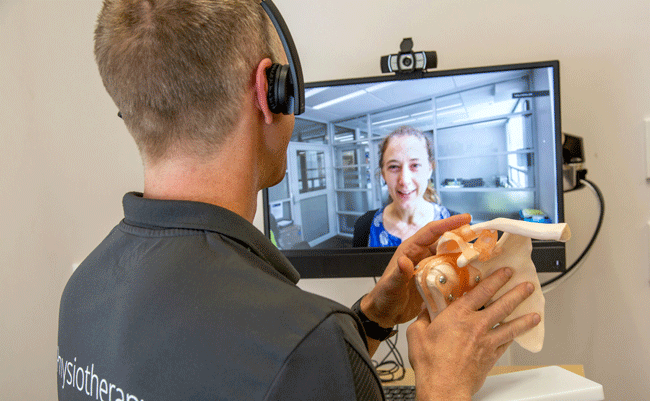
The School of Physiotherapy Acting Director of Dunedin Clinic/Professional Practice Fellow Matthew Dick speaks to a patient via Telehealth. Photo: Sharron Bennett.
The future of physiotherapy is here and it involves the convenience of your own home and your mobile phone.
Or your laptop, desktop, tablet; in fact any web-connected device with camera and audio capability.
It's called Telehealth and it's sweeping the health world, University of Otago School of Physiotherapy Acting Director of Dunedin Clinic/Professional Practice Fellow Matthew Dick says.
It allows the remote provision of health services via video conferencing. While it is a well-established technology both nationally and internationally, Mr Dick says he is unaware of it being used for physiotherapy before in New Zealand.
"... because of that extra access, because we'll be seeing our patients more frequently, we'll be able to monitor and adjust our recommendations accordingly."
As well as the convenience benefits, a 15-minute Telehealth consultation costs a patient nothing, thanks to ACC funding and the reduction in costs video-linking provides. And because the University's physio clinics are using existing video conferencing technology, there has been no need for expensive upgrades.
While all initial physiotherapy consultations are physical examinations, follow-up consultations seldom need to be, Mr Dick says. That means despite the reduction in hands-on physio time, patients are actually better off with Telehealth.
“A lot of the treatment we do is giving advice to the patient and helping them manage their condition. Monitoring their exercise programme can be done without getting them to come in twice a week. It takes a lot of time, coming in, finding a carpark, a lot of money.
“And because of that extra access, because we'll be seeing our patients more frequently, we'll be able to monitor and adjust our recommendations accordingly.”
While initially it was thought the new service would be aimed at those in far-flung locations, it has turned out even city-based patients are appreciating the convenience, he says. They have also appreciated the ease of use; patients don't need to learn any new technology skills.
"This is going to become quite a normal thing to do. So when these students graduate and go out to their clinics they'll be able to take this with them. Eventually everyone is going to know about Telehealth. And I think we're going to play a big part in that."
“They get an email with a link and when they click that link everything happens automatically. There's no logging in or starting an account. You do need a reliable internet connection, but if you can stream video you should be fine.”
He says the feedback from patients has been “only positive”.
“We're in a world where any sort of conversation with a camera is quite normal. I definitely think this is the future. I think the demands of society are pushing for better access. The technology is there.
“And when we've shown how this works, people can really see the potential and the future. They've gone from being sceptical to being quite excited.”
The move also means the University's physiotherapy students are being “futureproofed”, Mr Dick says.
“They're right on board with this. They love it, as do the patients.
“This is going to become quite a normal thing to do. So when these students graduate and go out to their clinics they'll be able to take this with them. Eventually everyone is going to know about Telehealth. And I think we're going to play a big part in that.”
Mr Dick says establishing Telehealth at the School of Physiotherapy would not have been possible without the support and encouragement of many, including Professor Michael Schultz of Medicine, Dr Carol Atmore of General Practice and Rural Health and Associate Professor Ben Wheeler of Women's and Children's Health, and Kyle Forde Chief Information Officer at Wellsouth Primary Health network.
The University's eConference team, in particular Jeff Ormandy, were “fantastic” in setting up and developing the workflow with Zoom, he adds.